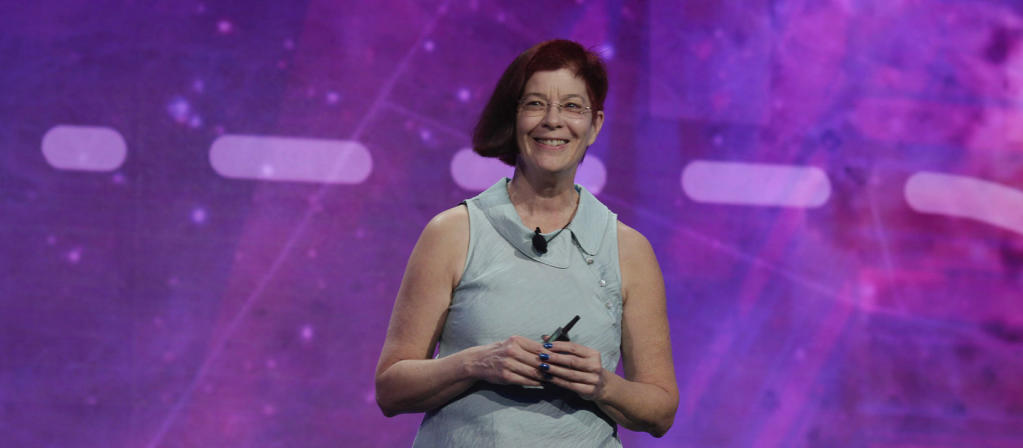
As chairwoman of Mozilla, Mitchell Baker believes a healthy society needs a healthy technological base.
Ford Foundation: What issues in the technology sphere keeps you up at night? What’s on your mind?
Mitchell: That an automated system, will increasingly understand more about how any individual reacts to stimuli than we do ourselves. Each of us has a view of ourselves and that’s how we make decisions. But there are a lot of our processes that aren’t completely rational or are impacted by our past — that’s hard to know when you’re living your life.
But data accumulation will understand those things. And so if you understand me better than I do, then it is easy, I think, for that system to manipulate individuals. And we as human beings aren’t really designed to effectively recognize and understand and counteract that degree of potential manipulation.
So, one question is: How do individual human beings continue to have agency, understanding and influence/control of how we’re acting?
Are there other concerns you have?
Over the last say 500, 600 years we’ve been building a balance between what is the power of the state and what is the liberty of the individual. And democratic nations all have slightly different balances. But we’re all in one end of the spectrum; an individual has some set of rights and protections vis a vis the state.
Some of the reactions to online problems appear to me to be shifting that balance dramatically. Without actually really processing all that we’re doing.
Tell us a little bit about you & your career trajectory. How did you wind up where you are?
There’s a legal term—sui generis—which means one of a kind or on its own. I would say looking at the odd path of my career, the thing that ties it together is a very deep interest in organizational dynamics. And social dynamics. How do communities form? How do people work together, why do they work together, what motivates people? And I’m a believer that human nature crosses all geographical boundaries but there are cultural variants on how it is expressed.
What do you wish you knew when you were starting out your career that you know today?
It’s hard to have a role model for my odd career path.
I think if I had understood earlier how helpful they could be, or that if you’re lucky, some set of people actually go out of their way to really help you, I would have liked to know that. I think that’s harder for women. I hope that’s changing for women.
But even so I think it’s a part of my success that I didn’t need that. That I’m comfortable forming my own path.
What were some unexpected obstacles that you encountered in carving out your own route, or that surprised you when they came up?
When Mozilla was spinning out of AOL, I was the leader of the Mozilla project. And there was an executive at AOL who just flat out refused to talk to me. Ten years later we start to see research about how sometimes it’s a no-win setting for women. If you’re not aggressive you’re passed over but if you actually are as assertive as the mostly men around you, you’re too aggressive and you’re unpleasant and all that stuff. All of that language, almost verbatim, is what he said about me.
And so really the fact that Mozilla exists as an independent organization, a nonprofit organization, is because there were other people, and they had to be men, around who were willing to bridge that gap between me as the leader of Mozilla and this man who refused to talk to a woman who knew what her organization needed and was determined to get.
What do you think is the most exciting thing about the growth of public interest technology?
How much we need it and how important it is. A healthy society needs a healthy technological base. Particularly internet and network society, because the internet is so general purpose.
So when you say the network or the ability to connect and collaborate, it crosses every topic you can imagine. That’s why Mozilla exists and why we’re a nonprofit. At Mozilla, we try to build public interest technology. But the world is giant and we need all sorts of people thinking about and building technology aimed at broader benefits than financial return to shareholders
So we see that interest arising now from a bunch of places. For example, there is a groundswell movement from a set of STEM practitioners. And we’re beginning to see institutions understand that and be interested in both and fund or support it as they can. We’re making our own contribution at Mozilla with our participation in the Responsible CS Challenge.
During this period of the last 10 or 15 years if you were in one of the big platforms, or maybe any internet technology company, you had this belief that you could do whatever you wanted with your technology and it was automatically good for society. You can’t blame 100% all the technologists for that because society sent them immense money and wealth and power and accolades and adoration. But I think those days are over. So there is a groundswell of interest to say, hey, I do want to care about what’s good at a broader level.
Note: This interview has been condensed and edited.
Mitchell is one of the Public Interest Tech voices we’ll be hearing from as part of this series over the next few weeks. Join us as we speak to thought leaders and discover their unique paths.
